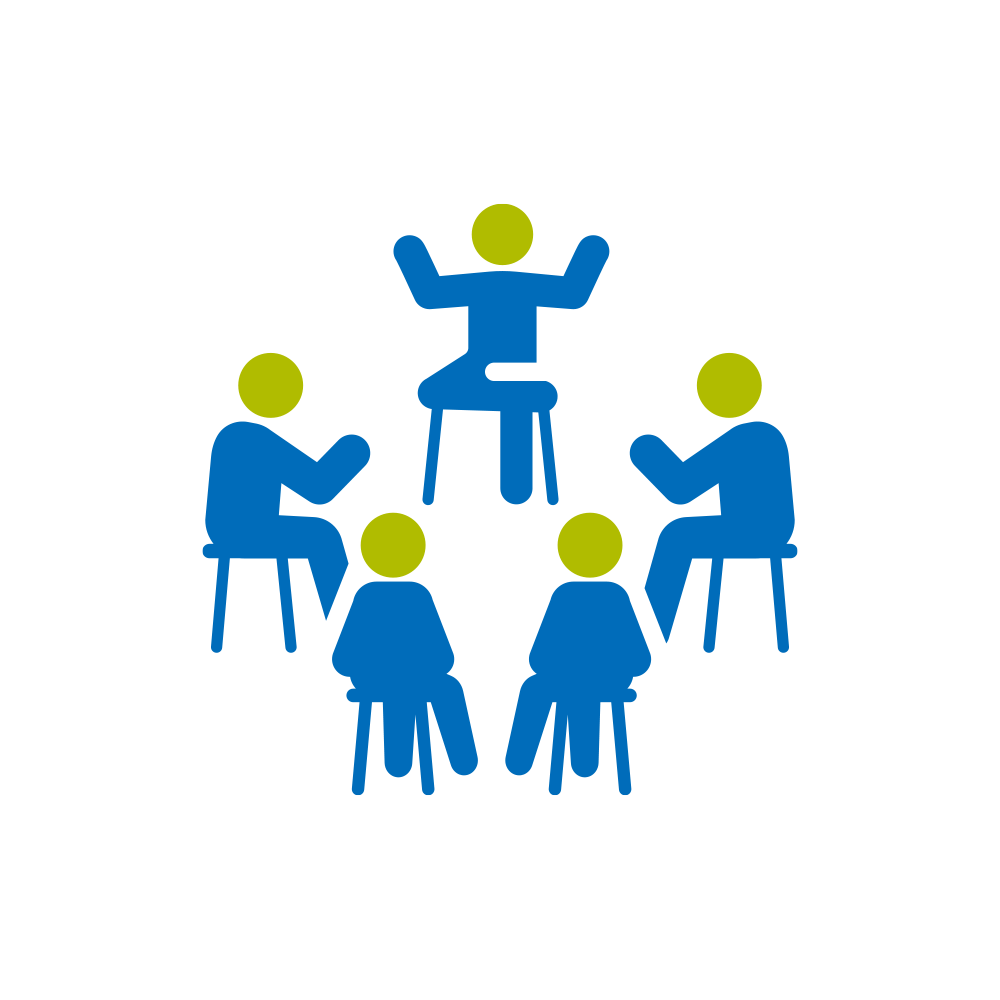IIRP Professional Development brings together research, theory, and practice. We offer a growing array of noncredit offerings to teach you the concepts and soft skills needed to stand out in your professional environment. Our experienced instructors are skilled practitioners, adept at helping you learn and implement restorative practices in your setting. Take the first step to gaining the practical skills and knowledge needed to get started today.
Search our wide array of professional development experiences to best suit your needs. Use the filter option below to identify your preferred method of delivery and experience level by checking the appropriate boxes. Our events are available as:
- Public event experiences:
- Open to all learners from various organizations, locations, and fields. Registration and schedules are available here.
- Private event experiences:
- Available for larger groups (>15), led by a dedicated instructor or team of instructors for your specific organization or team.
- We can work with your team's needs and schedule based on your organization’s availability.
Results:
Become a Restorative Practices Trainer
Prepare your team to teach others the IIRP curriculum for Restorative Practices for Educators and/or Restorative Justice Conferencing by completing our Fundamentals of Restorative Practices training and/or our Restorative Conferencing training. Participants will learn how to assist in the sustainable implementation of restorative practices in your school or organization.
This interactive event teaches participants how to deliver the curriculum to their colleagues, using our materials to provide training either in person or online. Specific tips are provided for how to deliver sessions online. We also include support for creating modules unique to your situation if you are unable to deliver the materials as suggested by the IIRP.
Designed For:
Experienced restorative practitioners who want to teach key concepts of Restorative Practices for Educators and/or Restorative Justice Conferencing to others.
Coaching
After your group has experienced one or more of our professional development offerings, there are additional opportunities to participate in ongoing coaching to support continued learning and implementation under the guidance of an IIRP instructor. Tailor coaching to support your organizational needs, focusing on specific topics or developing multi-tiered systems of support (MTSS). Each participating school will have access to an IIRP coach who is dedicated to providing specific deliverable activities. Coaching promotes the continued application of restorative practices, translating theory into effective actions.
Designed For:
Professionals in education who have a foundational knowledge of restorative practices and want to advance their practice by increasing their skills to build strong school communities, work with parents, and address challenging issues.
Facilitating Listening Circles

Listening circles are a specific type of circle designed to help people process an event or issue that poses a challenge or harm to their communities or has impacted people in a significant way. They are voluntary, community-oriented forums aimed at providing an equitable opportunity for all attendees to have voice. Listening circles can be used in a variety of settings, including communities, workplaces, schools, organizations, neighborhoods, universities, and within families. They have roots in indigenous cultures and are backed by research in interdisciplinary studies.
They are not focused on problem solving, dialogue, or debating. They are meant for creating a space for expressing, listening, processing, and community building.
Designed For:
Individuals aspiring to create brave space for a shared sense of understanding within their communities, organizations, schools, neighborhoods, universities, and families.
Intentional Classroom Engagement
Students thrive in a school where they feel welcomed and accepted, fostered by a spirit of shared ownership and responsibility within the classroom. The content of this event is based on the book Advanced Practitioner Series: Intentional Classroom Engagement by IIRP Senior Advisor to the President and Assistant Professor, Craig W. Adamson, Ph. D.. For the best experience possible, we strongly recommend purchasing and reviewing the book prior to this training.
Led by an experienced instructor, you will develop advanced skills and competencies for engaging with students. During each online session, you will explore a different aspect of intentional classroom engagement.
- Session 1 – Building Relationships – Examine areas for improvement in your professional practice and interpersonal influence in order to build relationships and community so that all feel included.
- Session 2 – Self-Reflection – Explore the role of self-reflection in building relationships to advance your practice and identify personal biases as a means to overcoming barriers to change.
- Session 3 – Maintaining Relationships – Cultivate a brave and safe space to foster vulnerability and authenticity, allowing students to genuinely express their identity, thoughts, and feelings.
- Session 4 – Responding to Harm and Reintegration – Explore the meaning and purpose of reintegration by examining ways to address harm and welcome students back into the classroom community.
Designed For:
K-12 teachers, staff, administrators, and restorative practitioners who have had previous training or classroom experience in restorative practices.
Motivational Interviewing: Restorative Dialogue and Interventions for Change
Bring awareness to individuals, enabling them to identify the discrepancy between their current behavior and their future goals. Participants will learn how to positively influence individuals to make meaningful life changes. Motivational Interviewing (MI) is a collaborative, research-based dialogue process that strengthens intrinsic motivation for change in individuals.
MI grew out of addiction treatment, but it has also demonstrated effectiveness in the fields of criminal justice, education, organizational management, and the healthcare industry.
Motivational Interviewing is particularly effective with individuals who are non-compliant and resistant to making changes. Understanding the “Stages of Change” will help practitioners develop strategies to support individuals in identifying and achieving their goals or developing new ones.
Designed For:
Counselors, K-12 teachers, staff, and administrators, members of the criminal justice field, and others.
Navigating Conflict: Restorative Practices in the Workplace
Creating vibrant, resilient workplaces with consistently high-performing teams can be challenging. How are such workplaces established? Through proactively approaching conflict and dealing with issues directly, effectively, and efficiently. Cultivating a work culture rooted in authentic conversation maintains high-performing teams, increases engagement, produces quality work, and increases workplace satisfaction that leads to higher retention.
Designed For:
Administrators, managers, supervisors, directors, project managers, organizational development specialists, leaders, and those who work on teams across various sectors.
Putting Theory into Practice for Advanced Circle Facilitators

Sharpen your skills for the facilitation of all circles, including proactive community building circles and responsive circles that address tensions and conflict. This collaborative online professional learning community explores what works, what doesn’t, how and why.
During each live session, participants may ask relevant questions, share their experiences, receive valuable feedback from their instructor and peers, and develop strategies for effective circle facilitation skill development and experience.
Designed For:
Designed for circle facilitators in any field or industry, each session is facilitated by one of our engaging instructors — experienced restorative practitioners who clearly articulate key concepts and field your questions. You will join them in a professional learning community with up to 20 passionate circle facilitators.
Putting Theory into Practice for Independent School Staff and Administrators
Are you invested in creating stronger relationships in your independent school environment through restorative practices? When independent schools integrate restorative practices into their administrative and academic methods, they establish a culture of collaborative leadership that increases voice, agency, and belonging for all community members and provides students with transferrable leadership skills that are crucial to functioning in a diverse world.
This collaborative online professional learning community explores what works, what doesn’t, how, and why.
Designed For:
Designed for independent school administration, staff, teachers, counselors, and board members who aim to build stronger relationships and increase the sense of belonging in their school setting.
Putting Theory into Practice for School Staff and Administrators

This collaborative online professional learning community explores what works, what doesn’t, how and why.
During each live session, participants may ask relevant questions, share their experiences, receive valuable feedback from their instructor and peers, and develop strategies for effective teaching and leadership.
This event is recommended for those wanting to gain the practical experience needed to Become a Restorative Practices Trainer.
Designed For:
K-16 teachers, staff, and administrators who possess a basic understanding of restorative practices by having completed Restorative Practices for Educators and/or Restorative Justice Conferencing. Ideal for individuals who are interested in being trained to deliver the IIRP curriculum in the future.
Putting Theory into Practice: Managing Re-Entry in a Trauma-Sensitive Classroom
Participants are guided by an experienced IIRP instructor to design and implement a trauma-sensitive re-entry approach when responding to incidents that have impacted their community, such as a violent event in school, the death of a community member, or a lockdown implemented for community safety or for the COVID-19 pandemic. You will be guided in planning for responses to these community impacts and the implementation of a support plan for all.
Participants will learn how to recognize those impacted by trauma and explore the nuances surrounding re-entry following a traumatic experience. School leaders can engender a positive school climate through processes that intentionally engage the most pressing concerns of students, staff, and families.
Designed For:
K-16 administrators who have completed Restorative Practices for Educators before registering.
Putting Theory into Practice: Restorative Justice Conferencing Facilitation
Incidents of conflict, wrongdoing, and harm occur everywhere, every day in schools, workplaces, college campuses, neighborhoods, and families. The restorative justice conference provides a way to engage with those who cause and experience harm, along with the affected community.
Through the professional learning community, participants will improve their facilitation competencies. They will utilize a process of self-reflection as they explore important considerations and context around the conflict being addressed. Participants will define what is needed to be successful in their specific setting as they contemplate the conference process as a responsive tool and its importance in building communities.
Designed For:
Designed for participants who have experience in work that relates to the reparation of harm or have a strong familiarity with restorative conferencing concepts. Sessions are designed for individuals from any profession who commonly deal with conflict in their position. This may include those who work in criminal justice, education, community-based organizations, youth services, and facilitation and intervention in these spaces.
Refresher
If it has been a while since your staff experienced the Restorative Practices for Educators training, your school could benefit from a refresher. We will review the tenets of restorative practices and discuss strategies to engage proactively and responsively with students, parents, and staff.
Designed For:
K-12 teachers, staff, and administrators who have completed Restorative Practices for Educators before registering.
Reimagining Campus Community with Restorative Practices
We recognize that every campus is unique. In-person, off-campus, and virtual academic life is vast and diverse. Encouraging deeper relationships between individuals and promoting social connections within the campus community strengthens equity, belonging, and collective efficacy. This leads to happier, healthier, and more productive campus communities.
In this professional development event, you will learn ways to foster and facilitate engagement and build positive relationships, whatever your sphere of influence on campus. This event is applicable to all members of the higher education community, from Academic Affairs to Student Life, including faculty, staff, and students.
Designed For:
Any and all members of the higher education community.
Restorative Justice Conferencing
Incidents of conflict, wrongdoing, and harm occur everywhere, every day in schools, workplaces, college campuses, neighborhoods, and families. The restorative justice conference provides a way to engage with those who cause and experience harm, along with the related community.
Restorative Justice Conferencing covers the fundamentals of facilitating a formal conference in response to an incident of wrongdoing or harm. You will then be able to utilize those skills to create deeper interpersonal understanding and repair relationships among those involved or affected by such an incident.
Designed For:
K-16 teachers, staff, and administrators, members of the criminal justice field, and other organizations. This experience is applicable to other audiences, but examples used come from school and criminal justice settings.
Restorative Leadership Development: Authority with Grace
Learning the principles of restorative leadership is essential to fostering a climate of engagement and collaboration. Programs and initiatives can be implemented more successfully in healthy, engaging workplace environments.
During this highly personalized event, participants examine their own leadership styles and characteristics through inventories and reflective processes. Participants share their leadership challenges and receive support and feedback to help build new organizational and implementation strategies.
Learn how to build relationships using practical supervision strategies, respond to conflicts with an approach that repairs relationships, and effectively manage organizational change.
Designed For:
Professionals who are familiar with restorative concepts. This event builds on key concepts learned in the Restorative Practices for Educators and Restorative Justice Conferencing events.
Restorative Practices for Educators

Building and strengthening relationships and community is a critical component of school culture. Restorative practices is an essential process for creating a positive learning environment, building social capital, and resolving relational issues.
During this two-day introductory experience, you will learn the fundamental theory and practices for engaging with students, staff, and parents in your school setting.
Topics include the importance of being explicit about practice, how to set high expectations while being supportive, and ways to build community in your setting. We will discuss giving direct feedback and asking questions that foster accountability, as well as utilizing effective methods to resolve common conflicts.
You will learn to apply the restorative practices continuum, understanding which restorative processes are best for achieving certain goals or responding to particular situations. We will focus specifically on facilitating circles, an essential process for creating a positive learning environment and school culture. Circles can be used both proactively and responsively to build social capital, sustain relationships, address social problems, and respond when harm occurs.
Participants will spend time planning circles to use in their schools immediately.
Designed For:
K-12 teachers, staff, administrators. This experience is applicable to other audiences, but school-based examples are used.
Restorative Practices for Independent School Educators
When independent schools integrate restorative practices into their administrative and academic methods, they establish a culture of collaborative leadership that increases voice, agency, and belonging for all community members and provides students with transferrable leadership skills that are crucial to functioning in a diverse world.
This learning experience focuses on creating systems that promote equity and inclusion for students and adults. During this two-day introductory event, you will learn fundamental theory and practices for engaging with students, staff, and parents.
Topics include the importance of being explicit about practice, how to set high expectations while being supportive, and ways to build community in your setting. We will discuss giving direct feedback and asking questions that foster accountability, as well as utilizing effective methods to resolve common conflicts.
Participants also learn to facilitate circles, an essential process for creating a positive learning environment and school culture. Circles may be used to build social capital, resolve social tension, and respond when relational or community harm occurs.
Designed For:
PK-12 administrators and staff working in an independent school setting.
Restorative Responses to Adversity and Trauma
As humans, trauma and adversity affect our emotional security, mental capacity, and physical well-being. Adversity touches everyone at some point through misfortune and hardship, whereas trauma can originate from specific events and be even more impactful on an individual.
Equip members of your school or organization with the skills to effectively work with individuals and groups that are impacted by adversity and trauma. Participants learn how to help individuals heal in the wake of personal harm, foster trusting and supportive relationships,
and develop methods to center personal self-care and avoid burnout.
Discover how to become a compassionate witness and use the restorative practices continuum as a tool to help address incidents of trauma.
Designed For:
Staff who understand restorative practices and wish to explore specific responses to adversity and trauma.
Trainer Retreat
Ready to take your training skills to the next level? Join us for a focused, hands-on, 2-day retreat designed for individuals who have completed the Fundamentals of Restorative Practices or Restorative Conferencing Training of Trainers event. This immersive experience is perfect for those looking to refine their expertise, expand their understanding of restorative practices, and deepen their knowledge of adult learning principles. Participants can expect to gain practical tools to become a more effective and engaging trainer and to build a customized development plan to guide their growth.
Designed For:
This retreat is for those who have completed a Training of Trainers event and are ready to take their facilitation, storytelling, and instructional design skills to the next level.
Whole-School Change
In addition to our professional development events, the IIRP also offers a school-wide implementation program.
Our multi-year implementation program teaches K-12 school administrators, educators, counselors, and support staff how to explicitly build positive school climate and culture using restorative practices.
Our program has been implemented in schools across the U.S., from urban to rural districts and has been proven effective in different studies.
Designed For:
K-12 school administrators, educators, counselors, and support staff